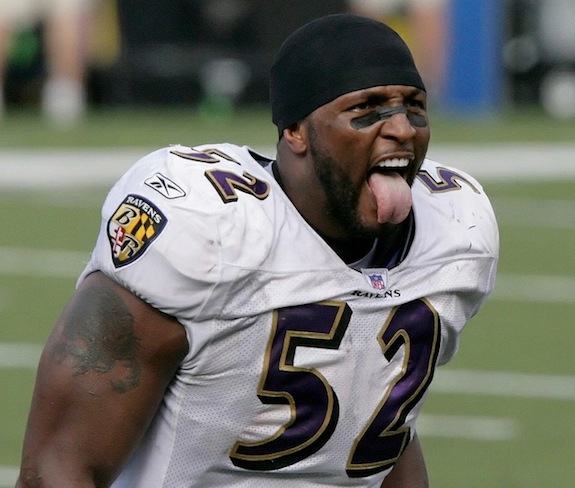Why Football Players Get Away With Everything, Even Doping
The people of the world have spoken: they don’t like cheaters, and they don’t like doping. Unless you’re a football player - in which case no one seems to care

Ray Lewis really does not care what you think. Image: Keith Allison
The people of the world have spoken: they don’t like cheaters, and they don’t like doping. Unless you’re a football player—in which case no one seems to care.
After his unemotional confession of doping, Lance Armstrong was one of the most hated people in the world. Some of the best baseball players in the history of the game won’t make it into the Hall of Fame because of doping. Olympians have been stripped of their medals, and there are several world wide organizations committed to keeping performance-enhancing drugs out of sports. Even the accusation of doping can ruin an athletes career.
Somehow, football has escaped the doping moral compass that steers every other sport. When it came out that Ray Lewis was using anabolic hormone IGF-1 in the form of a spray, everyone just made jokes about how that spray came from the velvet on deer antlers. Tons of other NFL players have been accused of or caught using performance-enhancing drugs, too. The Atlantic writes:
185 NFL players were identified as users of PEDs. One of the more shocking aspects of the report was the rapidly growing size of NFL players, and not just offensive linemen, whose average weight has increased by more than 50 pounds over the last two decades. The report identified players at every position, including quarterback, as using PEDs, and players from every NFL franchise were mentioned. At the time, the Union-Tribune study was called “the Mitchell Report of Pro Football,” referring to George Mitchell’s hugely influential 2007 report on PED use in major-league baseball. In fact, the Union-Tribune‘s list was nearly 100 players longer than Mitchell’s.
The comparison to baseball is a good one. Everyone thinks of Mark McGwire and Barry Bonds are cheaters. But when an army of football players is suspected of taking steroids, no one seems to care. But why?
Perhaps it’s the rough-and-tumble, cowboy-esque aura that surrounds football players. Ray Lewis isn’t just guilty of doping. He was also implicated in a fatal stabbing in 2000. After striking a deal with prosecutors, he was sentenced to 12 months probation. Despite his misdeeds, this year, Ray Lewis was the hero of the Super Bowl. And he’s not the only NFL player with a serious criminal record whose heroics on the field seem to be more important than his transgressions off of it. Think of Michael Vick. Or Plaxico Burress, who accidentally shot himself when carrying a concealed weapon in a night club.
Unlike in a pure endurance sport like running or cycling, there’s no pretense of purity in football. The backlash to Lance Armstrong was largely a reaction to his symbol as a survivor, as someone who relied purely on his own strength and stamina to pedal a little bike up impossible hills. People looked to Armstrong as a symbol of hope, a testament to the power of the pure human body. It’s harder to look at Ray Lewis and feel that particular type of inspiration.
Or perhaps football players get off easier, because it’s less obvious that they’re doping. When athletes in other sports take performance-enhancers, they’re noticeably bigger than their drug-free teammates. The before-and-after pictures of Mark McGwire are striking. When the East German swimming team showed up at the 1968 Olympics, they looked different than the other swimmers. But football players are all huge. It’s nearly impossible to tell who’s doping and who isn’t simply based on looks.
The Atlantic argues that a big reason football fans don’t care about steroids is that they don’t really care about data. The statistics that define a baseball player—the ones that make the greatest players the most loved—are the same ones that these steroids artificially inflate. But football fans, The Atlantic says, don’t care about those kinds of stats in the same way:
The reason there hasn’t been similar reaction among football fans is simple: There are only a handful of football fans for whom statistics really matter, and players at some positions—offensive linemen, for instance—have no statistics at all.
More likely, it’s not that simple, but a combination of all these factors and of the way America hangs on to football as a truly American sport—one where big, rough and tumble teams of insanely huge men slam into one another. It’s an arena for drinking beer and letting go of pesky work-day problems like purity and responsibility. Who cares if Ray Lewis sprayed some deer antler on himself to get an edge, really? Not most Americans, that’s for sure.
More from Smithsonian.com:
Football or Rugby: Whose Players are Tougher?
The American Football League’s Foolish Club
/https://tf-cmsv2-smithsonianmag-media.s3.amazonaws.com/accounts/headshot/Rose-Eveleth-240.jpg)
/https://tf-cmsv2-smithsonianmag-media.s3.amazonaws.com/accounts/headshot/Rose-Eveleth-240.jpg)